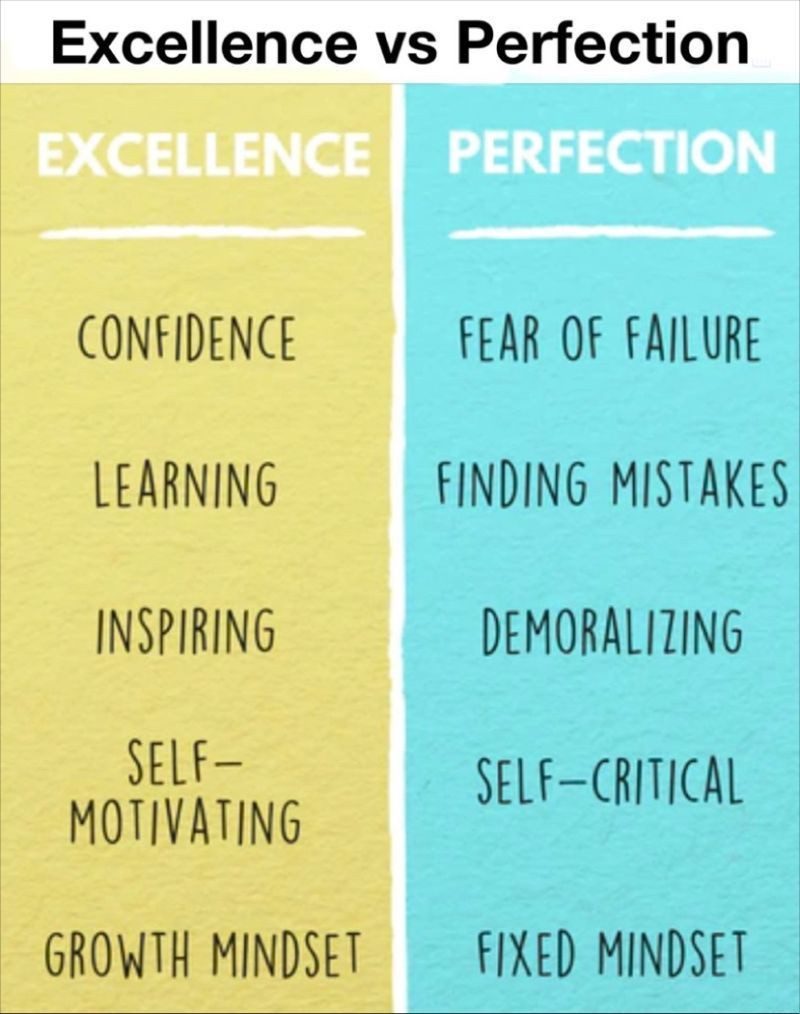In our pursuit of success and personal growth, it is important to understand the subtle yet significant differences between excellence and perfectionism. While both concepts involve striving for greatness, they differ in their underlying motivations, mindsets, and the impact they have on our overall well-being.
Perfectionism often leads to a negative and draining mindset. The constant pursuit of flawlessness creates unnecessary pressure and anxiety, resulting in depleted energy levels.
One of the most significant challenges that perfectionists face is the fear that if we stop shooting for perfection, we will become low achievers and our goals will fall by the wayside. However, letting go of perfectionist attitudes can actually help us to excel more!
Take a look at the below visual and ask yourself, “What type of mindset do I have?”

If you are interested in learning ways to shift your mindset from perfectionism to excellence, consider the below:
1) Being vulnerable:
Excellence thrives on vulnerability as it allows us to acknowledge our limitations and embrace a growth mindset. It is the recognition that we can learn from our mistakes and move forward with resilience. In contrast, perfectionism springs from a fear of exposing vulnerabilities; it seeks to hide imperfections rather than accept them. By embracing vulnerability, we open ourselves up to learning opportunities that propel us toward excellence.
2) Fearing failure:
Perfectionism is often rooted in an intense fear of failure or making mistakes. Perfectionists view any misstep as a grave error rather than an opportunity for growth or improvement. On the other hand, those striving for excellence recognize that failures are stepping stones towards success. They perceive setbacks as valuable lessons rather than indicators of personal worth or competence.
3) Living a little in the uncomfortable:
The pursuit of excellence requires venturing outside our comfort zones regularly. It involves taking risks and challenging oneself by engaging in new experiences or tackling unfamiliar tasks head-on. Perfectionists tend to avoid discomfort at all costs due to their obsession with flawlessness and control over outcomes. By embracing moments of discomfort with courage and determination instead, individuals pursuing excellence discover their true potential.
4) Being open to feedback:
Excellence necessitates being receptive to constructive feedback from others – mentors, peers, or managers – who can provide valuable insights into areas where improvement is possible. Those focused on perfectionism find it difficult to handle feedback since any form of critique is perceived as a personal attack on their self-worth. By appreciating feedback, individuals striving for excellence can refine their skills, make necessary adjustments, and continuously progress toward their goals.
“The pursuit of excellence is gratifying and healthy; the pursuit of perfection is frustrating, neurotic, and a terrible waste of time.” Ed Bliss
Overall, shifting your mindset to embrace excellence over perfectionism cultivates positive energy that uplifts and motivates us. While both are driven by high standards – they possess distinct mindsets with significant implications for our mental health.
Moving towards a mindset of excellence allows ourselves room for growth while fostering a healthier approach towards achieving our goals in all aspects of life.
